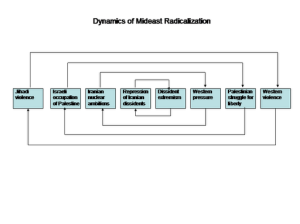“All options” in U.S.-Iranian relations have in fact never really been on the table. Compromise has not been an option. That would entail the end of the regional nuclear double standard as well as the recognition of Iran as a coming regional power. So Iranian-Israeli war continues to threaten. Does the Tel Aviv war party have a logical case? What, from that perspective, is the “best” that could happen?
Almost anything could happen were Israel to start an unprovoked war against Iran. Let us assume, for the purposes of argument, that it all goes just as the Israeli war party dreams. [Israel’s high-tech war of choice.]With Defense Minister Barak, let us assume that almost no Israelis will die. Let us assume that Israeli planes and missiles hit their targets and that those targets are perfectly selected from among the possible 300 or more Iranian nuclear sites. Let us assume that the bombing sets the Iranian nuclear research program back by an optimistic five years, more than former Mossad chief Meir Dagan and U.S. intelligence circles seem to think likely. OK, Netanyahu becomes the West’s Cowboy #1 and remains in office. The Palestinians realize they have no hope of justice in our time. Now what?
All Iranians, indeed all Muslims, will have all the justification in the world for using violence anywhere, anytime, in any way they may choose against Israel, and some will. After all, if Israel can start a war and slaughter civilians in the thousands just because it prefers that its adversaries not develop weapons that it has itself possessed for decades in abundance, then exactly what moral constraints can be said to exist on the anti-Israeli actions of others?
More to the point, what political constraints can then be said to exist? What Muslim leader could justify cooperating with or trusting Israel after an Israeli attack on an Iran that has conducted rhetorical war but, in comparison with Israeli attacks on Palestinians and Lebanese, behaved cautiously? Will Ankara submissively shelve its effort to occupy a moderate middle position in regional affairs or start looking for military allies to protect itself from the now unrestrained regional superpower? Would such an attack tip Egypt into an actively anti-Israeli position for the first time in decades? Is Israel prepared to deal with the implications of the termination of Egyptian support for the continued imprisonment of Gazans in their ghetto?
What would be the implications for the U.S. of a collapse of Iraqi government cooperation? Renewed anti-American violence in Iraq, attacks on the Green Zone, Baghdad breaking diplomatic relations on the eve of the U.S. presidential campaign: has Israel considered the degree to which Americans might begin to take seriously the question of whether or not the U.S. can continue to pay the national security price of an alliance with such a violence-prone state?
Will the Iranian quest for national security become such an obsession that all domestic factions unite in the search for a solution, transforming Iran into a far more determined, effective adversary? Israeli politicians seem to spend a lot of time thinking about the Osirak precedent; perhaps they should stop. When Israel bombed Iraq in 1981, no Islamic bomb existed. How many Pakistanis, in today’s vastly different atmosphere, will have sympathy for an Iran under attack for something it does not even yet possess? What bargaining chips might the concentrated thought of Iranian national security thinkers manage to identify for cutting a nuclear deal with Pakistan? Has Tel Aviv thought through the various bilateral Iranian-Pakistani issues (refugees, terrorism, Baluchi independence movement, joint resentment at American treatment, oil pipeline, strategic security advantages of cooperation) that Tehran, its attention focused by the horror and humiliation of an Israeli attack, might use to entice Pakistani cooperation?
In return for all those uncertainties, Israel will have managed to put the Iranian nuclear program back where it was in…2007?!? In 2007, it was believed by some that an Iranian nuclear bomb “could be possible” as soon as 2009. The war scare was so extreme in Israel that Israeli media sources were calling an Israeli attack “inevitable” and predicting that it would occur “in 2007.” Or maybe the Israeli attack will be so successful that, against expectations, it knocks the Iranian program all the way back to 2004, a time of such tension that Israeli Defense Minister Shaul Mofaz was threatening Iran with “all options,” codeword for a nuclear strike. Or maybe the Israelis would be so lucky as to knock the Iranian program a full 15 years back – to 1997, when Netanyahu was accusing Russia of “endangering the very future of Israel” by providing Iran with missile technology. Setting back the Iranian program by a few years may be crucial to a politician’s career but is of little significance for the long-term security of a state.
Now recall that all these potential pitfalls flowing from an attack offering such modest achievements are premised on the assumption that Netanyahu’s dreams of a quick, easy, 100% successful military strike are realized and, somehow, realized without Israeli recourse to nuclear arms–which would truly establish it as an international criminal enterprise of the first order–and that massive global fallout from exploded Iranian nuclear infrastructure does not result and that Iran does not in response sink a U.S. aircraft carrier in the Persian Gulf, etc., etc.. The set of post-attack dangers enumerated in the preceding paragraphs is the situation after the best possible outcome for the Israeli war party.




